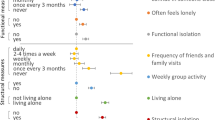Abstract
To explore the association between loneliness and efficacy to engage in health behaviors that are known to reduce the risk of early mortality in people with serious mental illness (SMI). This secondary data analysis was based on a cross-sectional study of 113 participants with SMI residing in New Hampshire. Ordinary Least Squares regressions were used to examine bivariate relationships between variables of interest. Participants had a primary mental health diagnosis of major depressive disorder (37.2%), schizophrenia spectrum disorder (28.3%), bipolar disorder (29.2%), or posttraumatic stress disorder (5.3%). High levels of loneliness were associated with low levels of self-efficacy to manage chronic diseases (p = 0.0001), as well as low levels of self-efficacy to manage psychological well-being (R2 = .31; F = 9.49, p = 0.0001; RMSE = 1.66). Loneliness may serve as a barrier to healthy behaviors, and thus, contribute to early mortality among people with SMI. The growing body of literature that demonstrates the importance of addressing loneliness in people with SMI should stimulate policymakers and researchers to target loneliness as a mechanism to address early mortality in people with SMI.
Similar content being viewed by others
References
Heinrich L, Gullone E. The clinical significance of loneliness: a literature review. Clin Psychol Rev. 2006;26:695–718.
Stravynski A, Boyer R. Loneliness in relation to suicide ideation and parasuicide: a population-wide study. Suicide Life Threat Behav. 2001;31(1):32–40.
House J, Landis K, Umberson D. Social relationships and health. Science. 1988;241:540–5.
Perese E, Wolf M. Combating loneliness among persons with severe mental illness: social network interventions’ characteristics, effectiveness, and applicability. Issues Ment Health Nurs. 2005;26:591–609.
Walker E, McGee R, Druss B. Mortality in mental disorders and global disease burden implications: a systematic review and meta-analysis. JAMA Psychiat. 2015;72(4):334–41.
Holt-Lunstad J, Smith TB, Baker M, Harris T, Stephenson D. Loneliness and social isolation as risk factors for mortality: a meta-analytic review. Perspect Psychol Sci: J Assoc Psychol Sci. 2015;10(2):227–37. https://doi.org/10.1177/1745691614568352.
Russell D, Peplau L, Cutrona C. The Revised UCLA Loneliness Scale: concurrent and discriminate validity evidence. J Pers Soc Psychol. 1980;39:472.
Folstein M, Folstein S, McHugh P. Mini-mental status: a practical method for grading the cognitive state of patients for the clinician. J Psychiatr Res. 1975;12(3):189–98.
Russell D, Peplau L, Ferguson M. Developing a measure of loneliness. J Pers Assess. 1978;42(3):290–4.
Sangha O, Stucki G, Liang M, Fossel A, Katz J. The self-administered comorbidity questionnaire: a new method to assess comorbidity for clinical and health services research. Arthritis Rheum. 2003;49(2):156–63.
Bandura A. Self-efficacy mechanism in physiological activation and health-promoting behavior. In: Madden J, editor. Neurobiology of learning, emotion and affect. New York: Raven; 1991. p. 229–70.
Hyland P, Shevlin M, Cloitre M, Karatzias T, Vallieres F, McGinty G, et al. Quality not quantity: loneliness subtypes, psychological trauma, and mental health in the US adult population. Soc Psychiatry Psychiatr Epidemiol. 2018;54:1089–99. https://doi.org/10.1007/s00127-018-1597-8.
Role of Funding Sources
Research was supported in part by National Institutes of Mental Health Award K01MH117496.
Author information
Authors and Affiliations
Corresponding author
Ethics declarations
Disclosure of Potential Conflicts of Interest
The authors declare no conflict of interest.
Research Involving Human Participants and/or Animals
This research involved human participants.
Informed Consent
Following the receipt of institutional review board approval in 2014, recruitment for this study began in February 2015 and continued through December 2018. Service users from the study site who met eligibility criteria were provided a description of the intervention and study procedures. Competence to provide informed consent was established by a Mini Mental Status Exam score ≥ 24. After informed consent was obtained, a baseline interview was scheduled.
Additional information
Publisher’s Note
Springer Nature remains neutral with regard to jurisdictional claims in published maps and institutional affiliations.
Rights and permissions
About this article
Cite this article
Fortuna, K.L., Ferron, J., Bianco, C.L. et al. Loneliness and its Association with Health Behaviors in People with a Lived Experience of a Serious Mental Illness. Psychiatr Q 92, 101–106 (2021). https://doi.org/10.1007/s11126-020-09777-8
Published:
Issue Date:
DOI: https://doi.org/10.1007/s11126-020-09777-8




